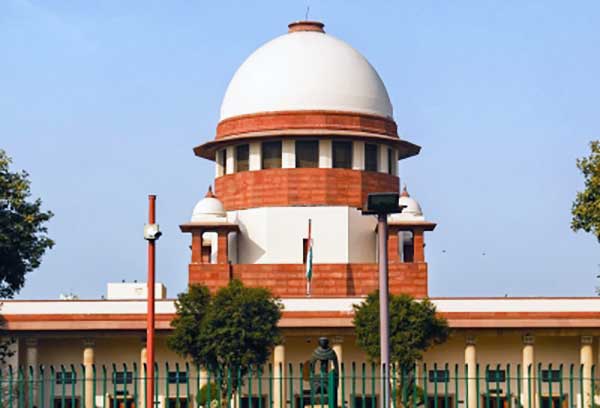The Supreme Court on Friday declined to entertain a PIL seeking a direction to the Lok Sabha Secretariat to inaugurate the new Parliament building by the president.
A vacation bench comprising Justices J.K. Maheshwari and P.S. Narasimha told the petitioner-in-person, why he has come to the court with such a petition and emphasized that the court is not interested in entertaining it under Article 32. The bench asked the petitioner, how is Article 79 relevant here?
Advocate C.R. Jaya Sukin said the president is the head of Parliament and it totally violates Article 79 and 87. Sukin argued that since the president is the head of Parliament, he should inaugurate the building, and questioned, how can the PM inaugurate the new Parliament building?
After the bench refused to entertain submissions, Sukin agreed to withdraw the petition.
The plea filed by advocate C.R. Jaya Sukin said that the respondents -- Lok Sabha Secretariat, Union of India, Ministry of Home Affairs, and Union of India, Ministry of Law and Justice -- have violated the Constitution and the Constitution is not being respected.
The plea said that the statement issued by the Lok Sabha Secretariat on May 18 and invites issued by secretary general, Lok Sabha about inaugurating the new Parliament building is an arbitrary manner without proper perusal of the records and without proper application of mind.
"That Parliament is the supreme legislative body of India. The Indian Parliament comprises the President and the two houses -- Rajya Sabha (Council of States) and Lok Sabha (House of the People). The President has the power to summon and prorogue either House of Parliament or to dissolve Lok Sabha," said the petition.
The plea contended that the prime minister (PM) is appointed by the president and other ministers are appointed by the president on the advice of the PM.
The plea submitted that the president is authorised to appoint constitutional functionaries such as governors, judges of both Supreme Court and high court, Comptroller and Auditor General of India, chairman and manager of Union Public Service Commissioner, chief election commissioner, financial commissioner, and other election commissioners. "That main function of both the Houses is to make laws. Every Bill has to be passed by both the Houses and assented to by the President before it becomes law," said the plea.
It said, "That Article 87 of the constitution provides two instances when the President specially addresses both Houses of Parliament. The President of India addresses both the Rajya Sabha and the Lok Sabha at the beginning of the first Session after each general election when the reconstituted Lower House meets for the first time. The President also addresses both the Houses at the beginning of the first session of each year."
The plea said: "That under Article 85, the President can summon each House of Parliament to meet at such time and place as he thinks fit, to ensure that six months shall not intervene between its last sitting in one session and the date appointed for its sitting in the next session."




Fall of Congress in Gujarat: Three decades of decline and struggle for relevance
The Congress party was once the dominant political force in Gujarat, shaping the state’s governance since independence. However, over the past 30 years, the party has witnessed a dramatic downfall, losing ground to the BJP’s aggressive electoral strategies, organisational strength, and ideological appeal.
‘Disempowering Muslims’: J&K political parties oppose Waqf (Amendment) Bill
All political parties of J&K, except the BJP, opposed the Waqf (Amendment) Bill, saying that the Bill is intended to disempower Muslims and only target one religion.
Radical group founder wanted in Jaipur serial blast plot apprehended in Ratlam
The Madhya Pradesh Police in Ratlam achieved a significant breakthrough in apprehending Firoz, also known as Sabji, a fugitive implicated in a conspiracy to execute serial blasts aimed at creating panic and terrorising the Rajasthan capital city of Jaipur.
Amit Shah & Akhilesh Yadav’s lighter exchange in LS over party president
Amid the uproar and heated debate between the ruling party and the Opposition over the Waqf Amendment Bill on Wednesday, the Lok Sabha witnessed some lighter moments between Home Minister Amit Shah and SP President Akhilesh Yadav.
Waqf Bill weakens Constitution, defames minorities, divides society: Gaurav Gogoi
As Parliament debated the contentious Waqf Amendment Bill, 2025, on Wednesday, deputy leader of Opposition in the Lok Sabha Gaurav Gogoi came down heavily on the government.
Bill not linked to religion, it’s prospective and not retrospective: Kiren Rijiju flays naysayers
Union Minister for Minority Affairs Kiren Rijiju on Wednesday tore into the Opposition for ‘spreading falsehood’ over the Waqf Amendment Bill and urged the ‘doubters and naysayers’ to refrain from misleading the people on the proposed reforms.
Parliament was being claimed as Waqf property: Rijiju slams UPA for making provisions 'overriding' other laws
Parliamentary Affairs Minister Kiren Rijiju on Wednesday bashed the previous UPA government for de-notifying 123 properties and handing them over to the Delhi Waqf Board.
Bhopal’s Muslims burst firecrackers in support of Waqf (Amendment) Bill
A large number of Muslims in Madhya Pradesh's capital, Bhopal, burst firecrackers on Wednesday to express their support for the Waqf (Amendment) Bill, which was presented in the Lok Sabha earlier in the day.